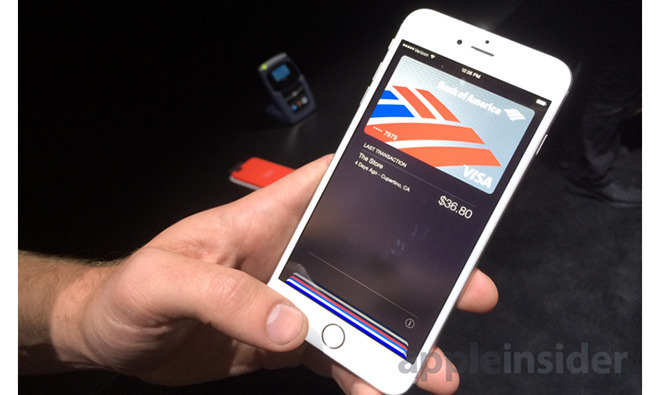A new survey has found the vast majority of U.S. retailers with EMV chip-card-compatible credit card readers aren't using that functionality, presenting a major hurdle for acceptance of tap-to-pay services like Apple Pay.
EMV-capable credit card readers are now in use at about 5 million merchants in the U.S., following last October's soft deadline imposed by credit card companies. But only about 1 million of them have enabled the systems to start accepting chip-and-signature, according to MarketWatch.
Banks and credit card companies encouraged adoption of EMV readers by requiring merchants who haven't switched to cover the costs of fraudulent transactions. But hiccups with software compatibility have resulted in most hardware units not actually accepting EMV chips.
The bottleneck likely has an effect on adoption of Apple Pay, which can only be accepted at NFC-compatible payment terminals. While the EMV switch gave merchants an opportunity to upgrade to credit card readers that accept both NFC tap-to-pay and EMV chip cards, the lack of adoption of EMV means that other features of the new terminals, like NFC, are not enabled either.
Put simply, Apple Pay requires EMV compatibility to work. Therefore a terminal without EMV capabilities enabled cannot accept Apple Pay.
With traditional credit cards, the EMV standard depends upon a small embedded chip to authorize transactions, rather than reading data from the magnetic strip. Apple Pay, on the other hand, handles the EMV verification directly on an iPhone or Apple Watch.
Last month, Apple announced that Apple Pay was accepted at more than 2 million locations around the world — Â a milestone crossed before the service expanded into China. It's also available in the U.S., U.K., Canada, and Australia.
 Neil Hughes
Neil Hughes








 Charles Martin
Charles Martin
 Christine McKee
Christine McKee
 Wesley Hilliard
Wesley Hilliard
 Malcolm Owen
Malcolm Owen
 Andrew Orr
Andrew Orr
 William Gallagher
William Gallagher
 Sponsored Content
Sponsored Content








31 Comments
I don't buy that. I have used ApplePay at several merchants (e.g. Harris Teeter) where the chip cards were still disabled, but where I could use NFC. So it doesn't seem that EMV is required for ApplePay to work.
Then get the frickin Canadian banks signed up already! American Express support just doesn't cut it up here in bacon and maple syrup land eh. ALL of our retailers up here in The Great White North have EMV chip reading machines so if you want widespread use, you should have started here. Dammit! If I want to use Apple Pay when I go buy my hockeystick, chainsaw, real beer or moose saddle please and thank-you, I should be able to........sigh.......sorry
The Chip Card Readers are slow. Even mine through Square.com, fast compared to most others, is slow. When you are in a hurry it is an issue. 15-20 seconds times 100 customers, back-to-back is a lot of wasted time! We use it but we have had to change procedures. Start filling the order before the customer gets the card back.
I come across a lot of retailers that still use the swiper with the chip-reader not working. It's actually frustrating. I don't blame the folks at the checkout-stand as it's not their fault. I just wished the stores would get their act together and be done with it. Even with them covering the costs of the transaction, it still doesn't seem to motivate them to get more current.
My liquor store of choice, upon receiving their new NFC-enabled terminals, briefly accepted Apple Pay, but hadn't enable the EMV readers at the time. Since then, the NFC capability has been disabled, and there are now lovely pieces of cardboard Scotch taped over the EMV reader slots. So, the statistic cited in the article doesn't surprise me one bit. As for Apple Pay requiring EMV compatibility to work, my personal experience seems to suggest otherwise.